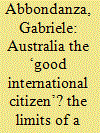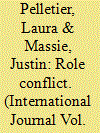| Srl | Item |
| 1 |
ID:
184768


|
|
|
|
|
| Summary/Abstract |
Australia is often described as a ‘good international citizen’ (GIC), which is intertwined to its status of ‘quintessential’ middle power. However, a number of elements might undermine both notions. This research reviews the concept of GIC and contributes to this niche of IR theory by providing a dedicated definitional framework, which consists of: i) the respect of the international law; ii) multilateralism; iii) the pursuing of humanitarian and idealist objectives; iv) an active support for the rules-based order; and v) a congruous identity matched by consistent domestic policies. After assessing the country’s foreign and domestic policies against this, it finds that Australia has damaged its GIC credentials due to a number of reasons, including: the hard-line policies against seaborne asylum seekers; the participation in missions that are not sanctioned by the UN; the transformation of its global multilateralism into a selective regionalism; the budget cuts to foreign aid; a controversial attitude towards climate change mitigation; and a preference for the US-led global order over a rules-based international society. Far from criticising the country’s foreign policy in its entirety, it argues that in the 21st century Australia behaves as a ‘neutral international citizen’, and a traditional but not ‘quintessential’ middle power.
|
|
|
|
|
|
|
|
|
|
|
|
|
|
|
|
| 2 |
ID:
155769


|
|
|
|
|
| Summary/Abstract |
This paper seeks to understand the peculiarity of the Trudeau government’s decision to withdraw Canadian fighter jets from Iraq and Syria. Most studies have focused on electoral turnover to account for early withdrawal from coalition operations. Yet no study offers a plausible explanation for why a centrist challenger, such as Trudeau, favoured early withdrawal despite public support and alliance pressure for continued involvement, and committed when in power to a bolder and riskier mission while withdrawing valued military assets from coalition operations. Building on foreign policy role theory, we argue that role conflict best explains the particularity of the Trudeau government’s withdrawal decision. In the wake of the 2015 federal election, the Liberal Party of Canada witnessed an intra-party conflict over which role to perform between that of a faithful ally and a good international citizen. The party leader finally proposed a compromise mission making Canada more involved on the frontlines.
|
|
|
|
|
|
|
|
|
|
|
|
|
|
|
|